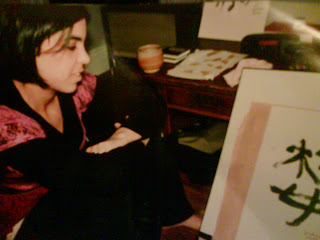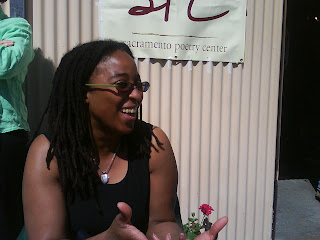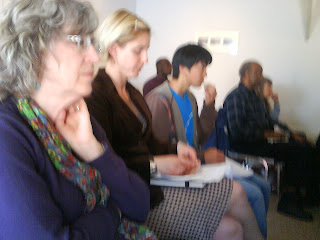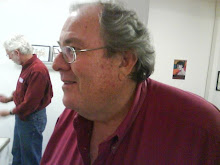Thursday, April 30, 2009
Tuesday, April 28, 2009
Lawrence Dinkins, Jr. sketches local poets
Friday, April 24, 2009
David Iribarne and guest at Luna's
Wednesday, April 15, 2009
Sandra Senne leads a special Poetry Workshop today, 4/15, at South Natomas Library
Jose Montoya, Advisory Board Member of SPC
Friday, April 10, 2009
Poet and Attorney Laura Baumann is a regular SPC workshop attendee
Wednesday, April 08, 2009
Rattlesnake's 5th Anniversary
Sunday, April 05, 2009
Judy Halebsky, now in Japan.
Saturday, April 04, 2009
SPC Dungy's Workshop at the SPC Conference
Conference workshop/lecture
Jeanine Stevens, Dr. Dorine Jennette and Henry Chen
Tim Kahl, Camille Norton, Camille Dungy, Matthew Zapruder
Thursday, April 02, 2009
JAN BEATTY
Lisa Jones Interviews Jan Beatty
Some people call it eating weather—
the way you swallow what you know
--Jan Beatty, from "Red Sugar"
Jan Beatty's recent book, Red Sugar, is about what is inside the body, whether we are talking about emotional weather or the sweet and sorrowful semiotics of blood. In "Skinning It," she says "Why is the raw body so unloved / When it's out-loud?" Though her work can take the reader to very hard places, Beatty refuses to silence the body. She writes an elegant, gritty poetry, grounded in her experiences as an adopted daughter of a blue-collar family and her adult journey through waitressing, social work, academia and teaching in a maximum security prison. She currently directs the Creative Writing program at Carlow University, teaches workshops for Mad Women in the Attic, and hosts a radio program, Prosody, on NPR-affiliate WYEP-FM, featuring the work of national writers.
While other women poets have come from the working class, Beatty owns this voice more fully and infuses it with a powerful feminist edge and a daring articulation of vulnerability and desire. The sexuality and renderings of violence in her work are provocative enough that Cincinatti-based Joseph-Beth Booksellers deemed her book unsuitable for an uncensored reading. Though they claimed to be protecting children in the bookstore, the reading was scheduled in the evening and they'd just recently had a famous male porn-star in for a book signing, leading Beatty and others to see this as a case of censoring based on sexism.
Beatty recently read her work at the Sacramento Poetry Center (video clips of her readings can be found at sacramentopoetrycenter.blogspot.com). Scroll down to Nov. 5, 2008 or find her poems and audio-clips on her website: janbeatty.com). Red Sugar is her 3rd book with the University of Pittsburg Press. Prior books include: Boneshaker (2002), Mad River (1995) and an award winning chapbook, Ravenous (1995). She's published in Quarterly West, Gulf Coast, Indiana Review, Court Green, and various anthologies. Her awards include a Heinz Foundation award, the Pablo Neruda Prize for Poetry, and two fellowships from the Pennsylvania Council on the Arts.
What got this book started?
. . . . In my last book I sort of killed the body off. It's about disassociation and dissolution of the body and I thought "what happens now?" Not that it is supposed to be a series in that sense, but I just didn't know what I would write about next--if the body is gone. I thought "well, I haven't gone inside the body" . . .
I love the way you build on [Gretta Erlich's line] "you walk inside yourself and eat weather" in the title poem "Red Sugar."
I guess I thought about what would be inside the body. I didn't think about it consciously, but looking back, I thought "We swallow so much and keep so much inside us, we don't even know what we're carrying--a lot of it should come out . . .
Did you notice from the beginning, the adoption issue? Did it take awhile before you could see that [in your work]?
Yeah, it took a long time. After my first book I didn't know.
It sounds like I'm naive about my own book, but I remember looking at Mad River and the first epigraph is by Louise Bogan. It says "not lost, abandoned, left behind, this is my hand upon the mind." Which to me is about abandonment as a child, but it wasn't a conscious thing. The book begins with a poem about my conception which seems narcissistic, but I wasn't aware that I was doing that, I swear. I always knew it was a huge thing, but it has just gotten bigger as time has gone on, not smaller.
A lot of poets have to comment, as you do, that this is not autobiography. What is it that readers need to understand about poetry on this subject?
. . . they just need to know beyond a shadow of a doubt that this is not autobiography. This is not the poet's life, this is not what the poet necessarily thinks or believes. You can write a poem in anyone's voice, you can have a narrator that's certainly not yourself. It is a work of art. Think of it the same way you think of stories or fiction. It's a piece of writing. It is not the person. They need to make that distinction.
Maybe if they are beginning writers or readers they get stuck there. . . . A lot of people writing poetry may think "well everything I'm writing is true, so then everything she wrote is true" and that's just not the case.
Besides if that is what you wrote it would be horrible poetry, because no one's life is like that . . . you know, you have to shape the poem to make it work and lie and steal and cheat and murder people in your poems . . . everything . . . . and it limits it so much--that's the sad part: if people think this is autobiography. It is much more than autobiography! It's everything--it's all possibility. It's not limited by our lives, which can be restrained a lot.
. . . . Another reason that irritates me is because of the horrible tradition of calling women poets confessional poets, because people--mostly male poets--have assumed that all women can do is write what has happened to them and that is so diminishing, so unacceptable. I hate that term. It was just a way to silence women and to say "what you are writing--it's a little different than what we're doing, your writing confessional poetry."
Sometimes we might censor ourselves. I had a powerful moment with my friend, (a local poet, Jenny Jiang). I was writing a personal poem about something many women have gone through and I said "I'm having a hard time with this, because it just seems like this story has been done so much." She said "would we say a man shouldn't write about a war experience, because it's been done too much?" I appreciate your work, because it shows how you can take a familiar, but personal story and be fresh with it.
. . . . You have to write what you are driven to write. Nobody gets to tell you what to write. My students are afraid to use "I"--first person--in their poems and I say "Well, who told you to do that?" They don't have an answer, but they got it somewhere. They are writing in these affected, strange voices that have nothing to do with them. Then they come into my office and tell me stories that are brilliant and interesting--so it does damage to people, that position. Like your story--"that's been told"--your story's never been told. Not like you would do it. Of course you have to find the craft, you have to find something to warrant the poem being written.
[In the class I visited today], you talked about the poem "Shooter"--you'd written pages and then you weren't sure what you had . . . .
I'll write pages of stuff and I'll have no idea what it is. I'll look at it later and say "this is terrible" or "there's nothing in here that feels important." Gwendolyn Brooks has that quote--a poem is when "you are importantly excited about an idea." Not when you are excited about an important idea, but when you are importantly excited. So I am looking for that. Is there something here that feels like it has life, necessity? If so, then I'll do more free writing.
I work with other writers--Judith Vollmer, who's been a mentor to me, and I show my work to Aaron Smith, who's a good friend, and they'll say "no this is terrible!" [Laughs]. And I'll say "really? I thought is was good" and they'll say "No, not so good." But you have to have people you trust to give you feedback, because sometimes we can't see what we are up to.
Lisa Jones is a staff interviewer for Poetry Now. A member of the Squaw Valley Community of Writers, she is currently editing their Annual Review. Her work has been published in Qarrtsiluni's Journaling the Apocalypse and in Poetry Now. She recently won first place for the Constance Topping Memorial Prize for poetry and received an honorable mention in the Sacramento Poetry Center contest. She can be reached at lisajonespoet@gmail.com.










































